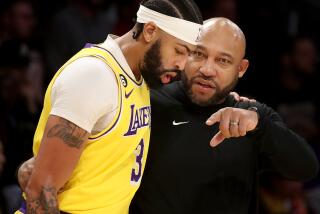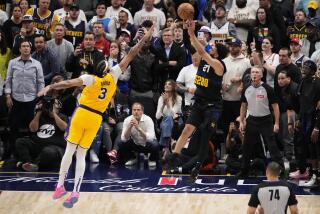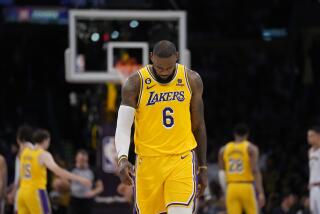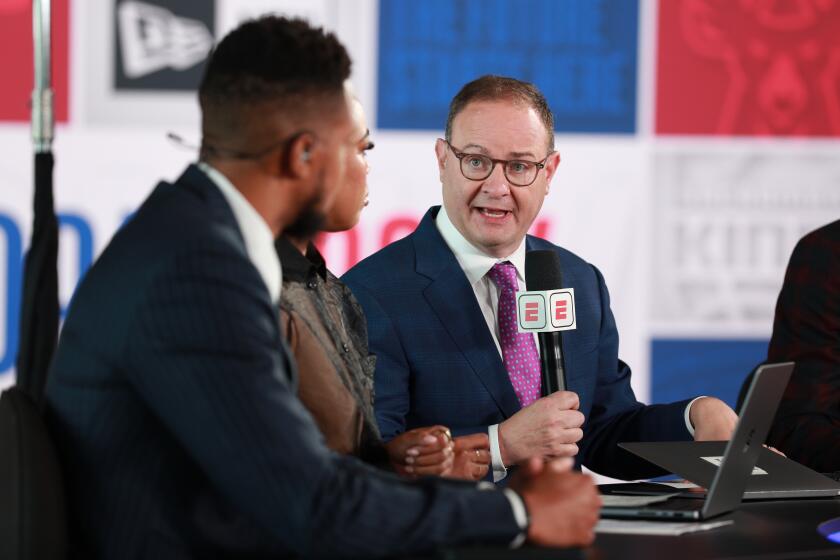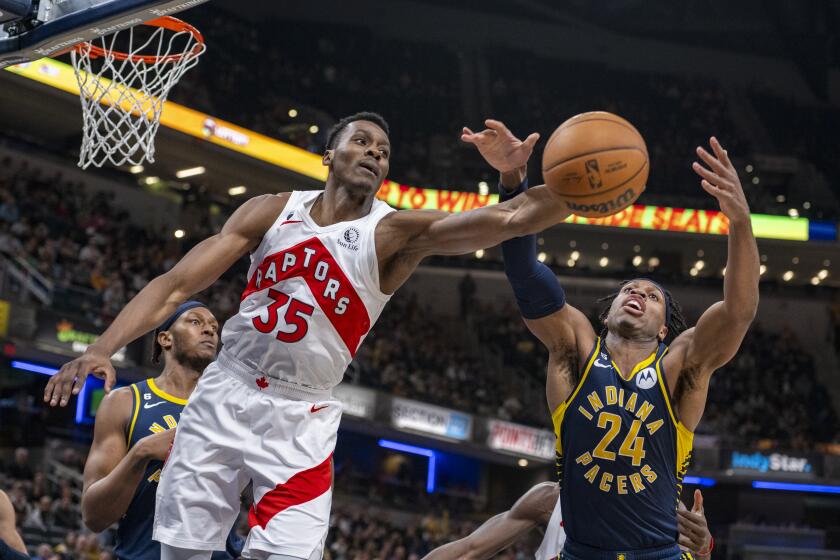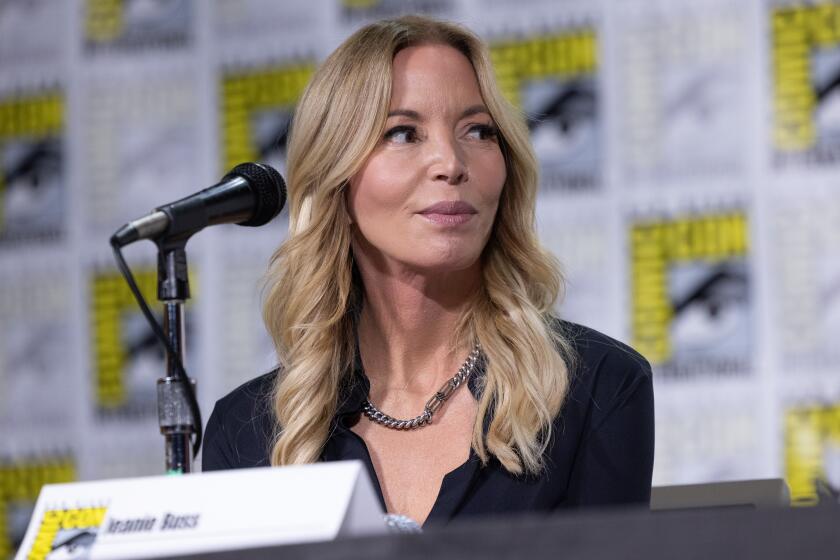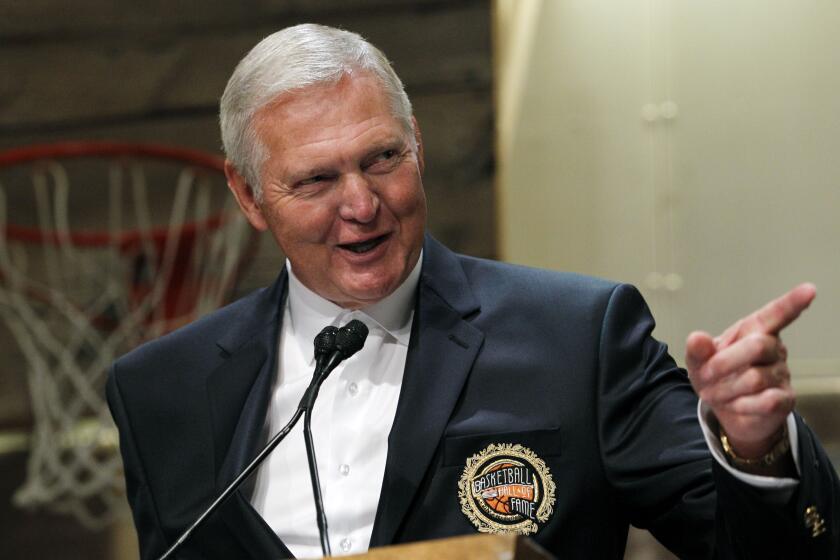West still a reluctant sports hero
Describing Jerry West is a little like analyzing molecules. Always has been.
He is a contradiction to contradictions, a right turn on a racing oval. Over the years, fittingly so, he spent most of his time with basketball players. It might have worked better had it been Sigmund Freud.
Make no mistake. West is popular and likable. He is well-spoken, well-read, incredibly proficient in most walks of life. He is 70 years old, still tall and slim and athletic, still able to beat his age in golf occasionally, still revered by the public in general and Lakers fans in particular.
He is “the Logo,” one of three nicknames that have attached themselves to him over the years, this one because the NBA chose a silhouette of him in a left-hand dribble to brand its image.
He is also “Mr. Clutch,” the label put on him by the late Lakers broadcaster Chick Hearn. That spoke to West’s abilities to make the shot that won the game at the end, as well as to his 14 seasons, 25,192 points and 14 NBA All-Star game selections, as well as a league most valuable player award.
“Los Angeles has been blessed to have so many star basketball players,” West said.
If there were any much better than West, it’s hard to name which one.
Still, the crown does not rest easily.
West can best be described as one of the most conflicted legendary sports heroes of our time. He is a man who has had a lifetime of success in nearly all facets and has never been comfortable with that.
Part of that might hark back to the third nickname, the one he likes the least: “Zeke from Cabin Creek.” That was placed on him by other players from bigger cities when he arrived in the NBA in 1960, the second pick of the draft and perhaps a comparative hick. He had been an All-American at West Virginia, and nobody questioned his basketball credentials. Nobody but him, that is.
“I didn’t think I was good enough to play in the pros,” he said back then.
As the second-youngest of six children growing up in the relative poverty of Cheylan, W.Va., and learning his basketball craft mostly alone on muddy outdoor courts with cheap hoops, West couldn’t have been less prepared for something like Los Angeles.
“Cabin Creek was about a mile away,” he said, elaborating with a snapshot of life in the ‘50s in a coal mining state. “That’s where we got our mail. I’d run there and back. Maybe that’s why I was in such good shape to play basketball. I remember running past Wade’s Pool Hall on a Saturday morning. You could tell how wild a time the coal miners had had the night before by how many of the windows were broken out.”
Those beginnings have apparently never left West, who lives here in the land of stars, egos, sound bites and Botox and who could be a Tommy Lasorda-like celebrity forever, if he so chose.
West doesn’t so choose.
He made a rare appearance Monday night at the Omni hotel as the honoree for a cause called Westcoast Sports, which raises money for area children in need. Even that was painful for West.
“I’ve always been very hesitant to get involved in anything honoring me,” he said.
But his appearance gave access to more media psychoanalysis, and West was his usual introspective, complicated self.
He called Lakers owner Jack Kent Cooke’s premature celebration of balloons in the rafters for Game 7 of the 1969 NBA Finals against Boston at the Forum “the most embarrassing moment of my life, one of the worst things I’ve ever seen.”
The Celtics, inspired by Cooke’s breach of common sense, beat the Lakers once again in the Finals. West won the playoff MVP award that season, the only player on a losing team to do so, and even that didn’t matter to him.
“I was not happy about it,” he said.
He wasn’t overly happy in some regards even after the 1972 Finals, when the Lakers finally did win the title, beating the New York Knicks, because he had had his worst Finals series.
“I’d played better every year in the playoffs than I did in the regular season,” he said, “except the one time we won.”
West personally carried the burden of those frequent Lakers Finals lapses, especially the many heartbreakers against the Celtics.
“I always felt we let the city down, that it was just disappointment after disappointment,” West said. “I remember, after one season when we lost, I was jogging with a guy on San Vicente Boulevard. And he says to me, ‘Well, you guys choked again.’ Now I’m not a violent person, but that day, I wanted to be.”
He is retired now, living here all year except during the summer, when he returns to West Virginia. He plays golf Wednesdays and Fridays at Bel-Air, does a lot of reading and will talk about his days as general manager of the Lakers and, more recently, the Memphis Grizzlies, only when prompted.
“When I went to Memphis [in 2002], I had been with the Lakers so long, I wanted to see what the other side was like,” he said. “I wanted to take on the worst. I guaranteed them we’d get to the playoffs. The second season, when we won 50 games, that was maybe the best time I had in my life.”
For most, their prouder moments in management would center on 10 years as Lakers general manager, after three successful years (1976-79) as Lakers coach. As Lakers GM, West established himself as one of the best judges of talent in the game, with acquisitions and maneuvers that brought and/or nurtured the likes of Magic Johnson and Kareem Abdul-Jabbar, as well as Shaquille O’Neal and Kobe Bryant.
He will always be a Laker, but will seldom be at ease with that. Asked about this season’s obvious great promise, West said, “You guys get too excited.” He said he was worried that Pau Gasol and Andrew Bynum may have to play more minutes together than they are comfortable doing.
“Everybody assumes they [the Lakers] will wipe everybody off the face of the Earth,” he said. “You better just play the season.”
He said he is writing a book, an autobiography that may carry the title “West by West.”
And no, Dr. Phil is not the author.
--
More to Read
All things Lakers, all the time.
Get all the Lakers news you need in Dan Woike's weekly newsletter.
You may occasionally receive promotional content from the Los Angeles Times.
